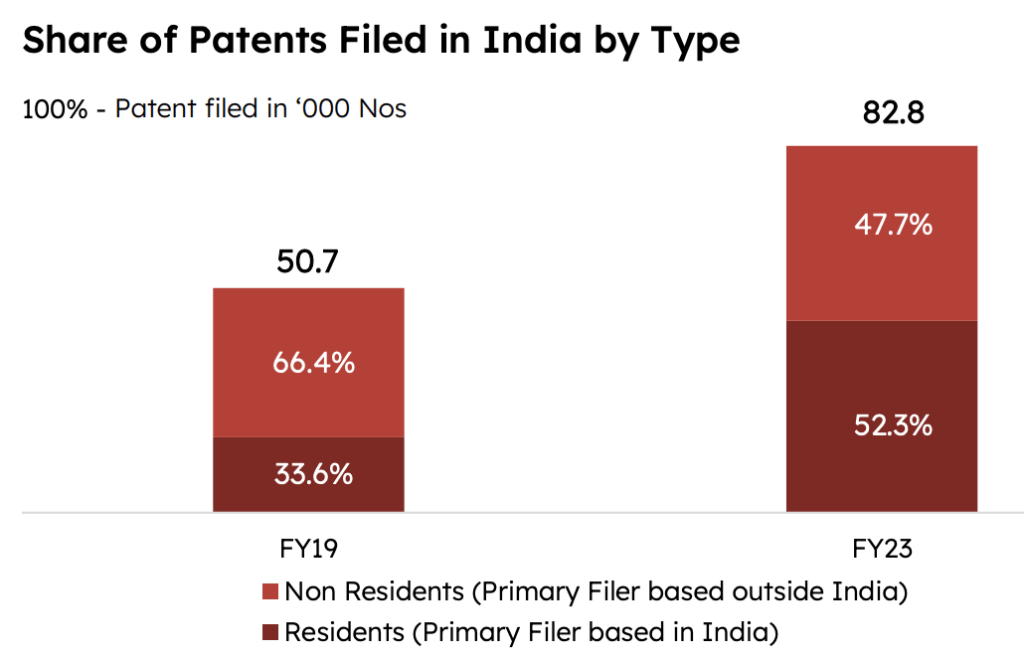India, with its burgeoning startup ecosystem and relentless technological advancements, is witnessing an unprecedented surge in patent filings. According to the latest report by Nasscom, approximately 82.8 thousand patents were filed in India in FY23, with an impressive 24.7% YoY increase. Even though the number of filings is impressive, it’s important to note that not all patents filed are granted. Only 41.2%, or approximately 34.1 thousand patents, were granted during the period.
The significant gap between the number of patent filings and grants underscores the rigorous evaluation process involved in patent granting, which ensures that only truly innovative and deserving inventions receive protection.
The number of patents granted in India during the last fiscal year increased 13.3% YoY.
For those unfamiliar, companies or individuals file patents primarily to safeguard their innovations and inventions from being copied or used by others without permission. Securing a patent grants the inventor or assignee legal rights, allowing them to exclusively profit from their creations for a specified period.
Rise of Indian Resident Patent Filers
One striking aspect that sets India apart is the dominance of Indian resident filers, which has surpassed non-resident filers. In FY23, Indian resident filers accounted for 52.3% of the total patent applications, a notable increase from 33.6% in FY19. This increase highlights the growing innovation capacity within the country.

It’s worth noting that educational institutes are increasingly directing their efforts towards creating intellectual property (IP), consequently fueling the growth of Indian resident filers. In FY23, educational institutions accounted for 23% of the total patents filed in India, a notable jump from 11% in FY22.
What’s particularly striking is the exponential surge in the number of patents originating from educational institutes, which tripled from 7.4 thousand in FY22 to an impressive 19.2 thousand in FY23.
Specific examples, such as the IP portfolios of premier institutions like IISC and IIT Madras, provide concrete evidence of this trend. As of March 31, 2024, IISC filed over 1000 IPs, including applications for trademarks and copyrights. Out of these, more than 600 IPs have already been granted.
Similarly, IIT Madras filed over 2700 IPs as of FY23, with 1300+ IPs granted or registered. These numbers underscore the significant contribution of educational institutions towards intellectual property creation and innovation in India, positioning them as key players in driving technological advancement and fostering a culture of innovation in the country.
Patents Filed by Deep Tech Startups
Another interesting revelation of the Nasscom report is that Indian startups are increasingly prioritizing innovation, as evidenced by major DeepTech ventures filing an impressive 922 patents since 2008. Surprisingly, the USA emerges as the primary source of patents for these enterprises.
Out of the total 922 DeepTech patents between 2008 and 2023, 676 were initially filed in India, but only 35% have been granted, compared to the USA’s 53% grant rate for 190 patents filed. This gap can be attributed to several key factors that set the USA apart from India in terms of patenting dynamics.
One major factor contributing to the USA’s advantage is the notably shorter average patent grant time, which is approximately twice as fast as India’s process. Additionally, investors in the USA tend to place greater importance on patents when considering funding opportunities, providing a distinct advantage to startups operating in that ecosystem. Moreover, the USA’s advanced infrastructure for researching and implementing new DeepTech technologies positions it as a primary market for pioneering innovations.
Zooming into India’s landscape, the Chennai patent office emerges as a central player, accounting for nearly 70% of all India-origin filings by DeepTech startups. Mumbai follows closely behind, accounting for 22% of these filings. These DeepTech startups are primarily focused on AI and Healthcare innovations.

Overall, Tamil Nadu emerges as the leading state in terms of patent filing, attributed to its favourable ecosystem and supportive policies. During FY23, Tamil Nadu claimed the top spot with a share of 9.3% in total patent filings, surpassing Maharashtra, which stood at 6.8%. Several key factors have contributed to this growth.
On a global scale, the momentum of intellectual property creation is on the rise. The number of patents filed reached 3.46 million by the end of CY 2022, up from 3.4 million in CY 2021. Although India’s share in this global landscape remains relatively small, the upward trajectory from 1.8% to 2.2% reflects a promising trend.
By focusing on fostering creativity, supporting entrepreneurship, and strengthening intellectual property laws, India is well-positioned to enhance its standing in global intellectual property (IP) creation.

